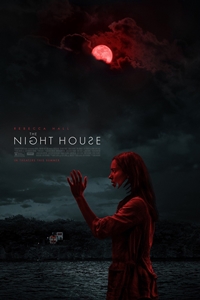The Night House (R) ★★★
 Dread - it's the lifeblood of any good horror movie/ghost story. Blood, gore, and a high body count are all nice accompaniments, but for a film in the genre to work, it has to fill the viewer with an almost suffocating sense of doom. When it comes to this quality, The Night House gets high marks. So high, in fact, that it's easy to overlook some of the production's failings (in particular, a weak ending). Credit director David Bruckner, who knows more than a thing or two about atmosphere and suspense; cinematographer Elisha Christian, who uses some inventive shots to enhance the mood; and actress Rebecca Hall, whose Beth is front-and-center for nearly every scene.
Dread - it's the lifeblood of any good horror movie/ghost story. Blood, gore, and a high body count are all nice accompaniments, but for a film in the genre to work, it has to fill the viewer with an almost suffocating sense of doom. When it comes to this quality, The Night House gets high marks. So high, in fact, that it's easy to overlook some of the production's failings (in particular, a weak ending). Credit director David Bruckner, who knows more than a thing or two about atmosphere and suspense; cinematographer Elisha Christian, who uses some inventive shots to enhance the mood; and actress Rebecca Hall, whose Beth is front-and-center for nearly every scene.
When the movie starts, Beth is reeling from the suicide of her husband, Owen (Evan Jonigkeit). She never saw it coming and can't understand what provoked her spouse to put a gun to his head and pull the trigger. Her best friend, Claire (Sarah Goldberg), is worried about her fragile mental state, especially when Beth returns to the lake house she and Owen shared. The first night is difficult, especially when something very loud goes bump. Beth investigates but there's no sign of anyone inside or out. Night after night, the intensity of the supernatural events escalates: a stereo system turns on by itself, there are unexplained text messages, and a house across the lake lights up like a beacon. Beth recognizes there are really only two possibilities: either she's losing her mind or she has become the victim of a haunting, and that haunting is related to the mystery of why Owen killed himself.
Bruckner starts with a sense of sadness and loss, adds a dash uneasiness, gets us to jump when something comes knocking past the witching hour, then takes us on a journey that's either a descent into madness or a confrontation with an uncommon sort of demon. The ambiguity of Beth's sanity, and the question of how much we see is real (rather than a figment of her nightmares and delusions) is one of The Night House's strengths. Beth recognizes that she might not be the most reliable of narrators. In the cold light of day, after believing she received texts from a dead Owen, she conducts an investigation of whether those texts were sent/received (and discovers they weren't).
The movie belongs to Rebecca Hall. Sporting an American accent, she delves into Beth's deteriorating mental condition and provides a compelling portrait of a woman who, devastated by grief, is barely holding it together. (Or is she?) Brief flashbacks give us a baseline of who Beth was before Owen's death. As the movie starts, she's struggling with issues that anyone faced by the suicide of a loved one must confront. Then the supernatural things start and finding the truth becomes Beth's obsession. Hall is credible in every iteration of Beth's character. The supporting players, including Sarah Goldberg and Vondie Curtis-Hall as concerned parties, exist primarily to prevent this from becoming a one-person film.
I didn't fully buy into the ending, but that's a common failing of even the best horror movies - the genre is more about the overall experience. The conclusion exists to provide a convenient stopping point. The Night House's final scenes feel forced and expedient, although they allow Bruckner to wind things up in less than 105 minutes without getting too deep into the weeds. Not everything is spelled out - the viewer is expected to do a little lifting, although none of it of the heavy variety.
The Night House may frustrate some who prefer their horror to be more graphic and in-your-face, although the movie isn't without its share of disturbing images and grisly goings-on. This is a creepily effective excursion into terror that, if watched alone in the dark, may generate post-movie jitters. It's a quietly intense alternative to generic horror movies that provides its share of scares without the need to splatter the screen with blood and viscera.
© 2021 James Berardinelli
To get the full Quicklook Films experience, uncheck "Enable on this Site" from Adblock Plus
box office top 10

Civil War Released: April 12, 2024 Cast: Kirsten Dunst, Wagner Moura 11.1M

Abigail Released: April 19, 2024 Cast: Melissa Barrera, Dan Stevens 10.2M

Godzilla x Kong: The New Empire Released: March 29, 2024 Cast: Rebecca Hall, Brian Tyree Henry 9.5M

The Ministry of Ungentlemanly Warfare Released: April 19, 2024 Cast: Henry Cavill, Eiza Gonzalez 9M

Spy x Family Code: White Released: April 19, 2024 Cast: Takuya Eguchi, Saori Hayami 4.9M

Kung Fu Panda 4 Released: March 8, 2024 Cast: Jack Black, Viola Davis 4.6M

Ghostbusters: Frozen Empire Released: March 22, 2024 Cast: Paul Rudd, Carrie Coon 4.4M

Dune: Part Two Released: March 1, 2024 Cast: Timothée Chalamet, Rebecca Ferguson 2.9M

Monkey Man Released: April 5, 2024 Cast: Dev Patel, Sikandar Kher 2.2M

The First Omen Released: April 5, 2024 Cast: Nell Tiger Free, Bill Nighy 1.7M






